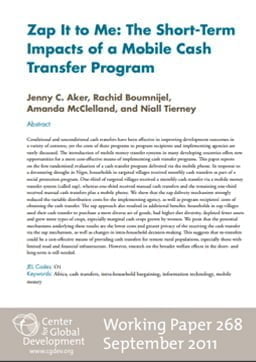Zap It to Me: The Short-Term Impacts of a Mobile Cash Transfer Program
Conditional and unconditional cash transfers have been effective in improving development outcomes in a variety of contexts, yet the costs of these programs to program recipients and implementing agencies are rarely discussed. The introduction of mobile money transfer systems in many developing countries offers new opportunities for a more cost-effective means of implementing cash transfer programs. This paper reports on the first randomized evaluation of a cash transfer program delivered via the mobile phone.
In response to a devastating drought in Niger, households in targeted villages received monthly cash transfers as part of a social protection program. One-third of targeted villages received a monthly cash transfer via a mobile money transfer system (called zap), whereas one-third received manual cash transfers and the remaining one-third received manual cash transfers plus a mobile phone. We show that the zap delivery mechanism strongly reduced the variable distribution costs for the implementing agency, as well as program recipients’ costs of obtaining the cash transfer. The zap approach also resulted in additional benefits: households in zap villages used their cash transfer to purchase a more diverse set of goods, had higher diet diversity, depleted fewer assets and grew more types of crops, especially marginal cash crops grown by women. We posit that the potential mechanisms underlying these results are the lower costs and greater privacy of the receiving the cash transfer via the zap mechanism, as well as changes in intra-household decision-making. This suggests that m-transfers could be a cost-effective means of providing cash transfers for remote rural populations, especially those with limited road and financial infrastructure. However, research on the broader welfare effects in the short- and long-term is still needed



